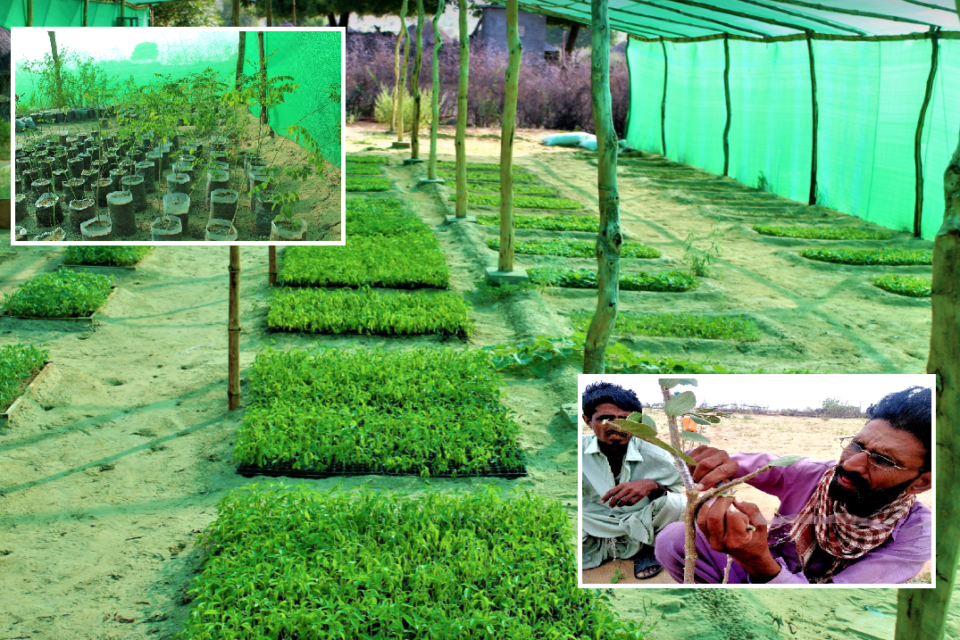By: Ghulam Murtaza
Imagine you are traveling in a dry desert, all you can see is dry land with no signs of water anywhere, all surrounded by dry land, scattered bushes and few trees, all of sudden you end up in an oasis like place and find Pakistan’s remotest nursery in the middle of desert. This is what I found during my recent visit to Tharparkar.
When we hear about Tharparkar Sindh, the first thing that comes in our mind is poverty, drought, dry dunes, thirst and hunger. Most of the villages in Tharparkar face challenge of water scarcity, even if the water is available, it’s not safe for drinking or any other household activity. In such harsh environment Mr. Dildar Lashari, a resident of village Jhando Lashari, Tharparkar, has established remotest nursery in Pakistan. The nursery is established in middle of desert where you could hardly see any other vegetation. Establishment of a nursery with more than 120000 plants and over 200 trees, in a one of the remotest villages of the country, is a great example of human endeavor and continuous efforts.
Mr. Dildar Lashari, first established a communal fruit garden in his village about three years ago. His interest for environment conservation and tree plantation increased, after he attended some events in his village facilitated by an NGO, Research and Development Foundation (RDF). Soon he became an active member of the village organization and acquired some technical knowledge on how to manage and maintain his fruit garden. Slowly his garden became famous in surrounding villages and people from other villages asked him to support them in establishing fruit gardens in their villages. Mr. Dildar Lashari learnt plant grafting technique and started grafting Thari ber (Jujubi) with other species of Jujube to increase fruit production. The grafting technique worked wondrously and since 2019 he has grafted more than 4000 plants, most of which have started giving fruits. His fruit garden has many fruit trees including, grafted Jujubi trees, Black plum trees, Moringa, Jungle Julebi (Pithecellobium dulce), Kandi and other local trees such as Babul (acacia) and Neem trees.
In year 2021 he aimed to establish a nursery to grow seedlings for different vegetables. His idea was great, but he had many fears in his mind! Who will buy plants in water scare area, who will plant vegetables at a place where people strive for drinking water? He initially shared his idea with few friends, some of whom categorically rejected his idea and even ridiculed him, however, there were others who welcomed his idea. To materialize his idea, he knocked the same door from where he had received his initial training. He went down to Chachro, Tharparkar, about 80 KM from his village, on his motor bike and shared his idea with agriculture expert of the same NGO. The agriculture expert was amazed with his idea and assured him full technical support. Mr. Dildar learnt about nursery management and soon started planning to construct the nursery. Keeping monsoon rains in his mind, Mr. Dildar Lashari, along with his wife, two daughters and a son, started constructing the nursery in the beginning of 2021 and started sowing different plants from June 2021.
Mr. Lashari shares that, first he wanted to grow tree plants and some flowers but he realized that there weren’t fresh vegetables available in his village as nearest town is about 50 Km away. Also due to poor financial conditions, not many can afford to buy fresh vegetables. So, he decided to plant vegetable seedlings so that people can grow vegetables in their own houses. The idea is great and very practical as well, however, the real test of Mr Dildar’s idea will start at second stage i.e when people purchase seedlings from him and plant in their houses. If Mr. Dildar’s idea is successful in the second stage, this can be a revolution in eliminating malnutrition, ensure food security and eventually increase family income of the people of desert.
Now Mr. Dildar has more than 120000 vegetable seedlings ready for plantation. The seedlings include, Ocra plant, onion, chili, tomato and other seasonal vegetable. He has adopted modern irrigation techniques such as drip and pitcher irrigation to save water.
Though, Mr. Dildar and his family has put all their efforts to grow a large number of seedlings but he was little skeptical about the customers. As they say, when humans strive, God rewards. With a stock of luck Mr. Lashari has received an order of supplying one hundred thousand seedlings to be supplied in different villages of Tehsil Chachro, Tharparkar. This will defiantly open more door for Mr. Lashari
Water has always remained one of the most important resource for humans and all other living species. Early humans settled where there was abondance of water, they established small human settlements and gradually these settlements turned into villages and towns. All human civilizations have flourished where there is plenty of water. Human life is completely dependent on water and where there is scarcity of water, life becomes a betel of survival. However continuous human effort can help in countering such situations and Mr. Dildar Lashari’s Nursery is best example of it.

